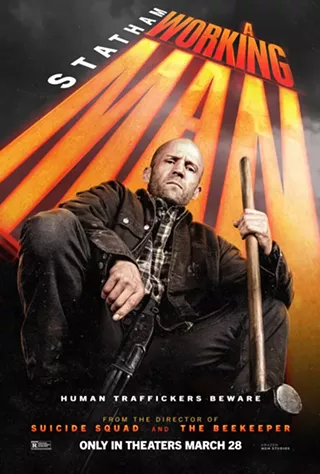In case you've been living under Iraq for the last couple years, Enron was a giant "energy trader" corporation that defrauded its investors of billions of dollars, ran an international shell game, treated the stock market like a giant Ponzi scheme and created fake energy shortages in California that briefly increased the price of electricity by a factor of 20.
So, essentially, this was a company of criminals, 15 of whom were indicted for their crimes. Their schemes were tremendously complex, involving selling nonexistent products, recording debt as profit and using a bookkeeping method that was apparently loosely adapted from The Lord of the Rings. In the end, the people in charge wound up magnificently wealthy, and their friends became president of the United States and governor of California. Curious.
Director Gibney nicely presents this story as clearly as possible, and with a general story arc so that the profundity of the evil becomes deeper and deeper with each scene.
Gibney begins with a brief précis of the financial history of Enron: It took them 16 years to raise the company's value from $10 billion to $65 billion, and then 24 days to lower it to zero dollars. How they did that is a fascinating story, because it involves a company that didn't really do much besides shift money around. While Enron was posing as an energy company, it was really a complicated con game that involved deceptively increasing the value of the stock so as to bring in new investors, which in turn increased the value of the stock, which in turn brought in new investors.
They did this not only by juggling the books to make debt look like profit, but also by an accounting system called "mark-to-market" which allowed them to put down estimated future earnings as profit. Of course, "estimated" is a fun word, and if you worked for Enron, you probably interpreted it to mean "completely pulled out of our asses."
In fact, Enron went so far in their zany schemes that one of their shell companies was actually listed as being run by "M. Yass," i.e. "my ass," so that they could literally claim to be pulling money out of their asses.
Of course, everyone cheats, and we hardly expect corporations to behave better than convicts. What sets Enron apart, though, are two things: the way they knowingly and happily performed magnificent acts of evil, and the way they managed to insinuate themselves into the halls of power. They were the largest contributor to G.W. Bush's first presidential campaign, and when Bush was asked about this, he said, "If they came to this administration looking for help, they didn't find any." Well, except that Enron CEO Ken Lay's personal pick was made head of the Federal Energy Regulatory Commission, and when California came seeking relief from Enron's banditry, Dick Cheney gave an unqualified no, based on personal meetings he'd had with Ken Lay. In perhaps their most diabolically cinematic act, Enron was also instrumental in putting Arnold Schwarzenegger in the governor's chair, thus ensuring doom for Sarah Connor.
But the breakdown of the barrier between business and government is probably less shocking than the way that the Enron traders had of reveling in their bad deeds. Gibney includes taped phone conversations between Enron traders in which one, describing their methods, says "he just steals money from California to the tune of ... ." He is interrupted by his nervous colleague who says, "Can you rephrase that?" "OK," continues the first man, "he arbitrages the California market to the tune of $1 million or $2 million."
It's one thing to admit the theft so cavalierly, but the tapes go on to show Enron traders laughing about causing bankruptcies, and, most chillingly, upon hearing that a deadly wildfire under a power main is reducing output, and thus raising rates, one of the traders chuckles and says, "burn, baby, burn!" Because it's very amusing when wildfires destroy homes and lives. Well, it is if you're so steeped in a corporate culture of evil that, as one trader smilingly put it, "If I have to tread on the other guy's neck to get my bonus, I'm gonna tread on his neck!"
Gibney repeatedly cites Stanley Milgram's "Obedience to Authority" experiments, in which test subjects agreed to administer lethal electrical shocks if told to do so by an authority figure, as an explanation for Enron's evil. But it doesn't quite fit, because these people aren't so much fearfully following authority as being massively, financially rewarded for their sins. I guess that's the difference between totalitarianism and capitalism: In the latter, evil isn't an obligation; it's a profitable choice.










